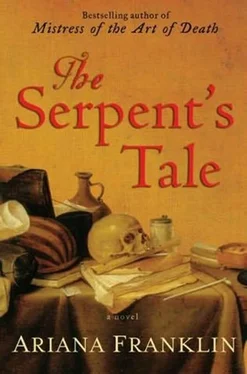
Ariana Franklin
The Serpent’s Tale
The second book in the Mistress of the Art of Death series, 2008
To Dr. Mary Lynch, M.D., FRCP, FRCPI,
consultant cardiologist.
My literally heartfelt thanks.
T he two men’s voices carried down the tunnels with reverberations that made them indistinguishable but, even so, gave the impression of a business meeting. Which it was. In a way.
An assassin was receiving orders from his client, who was, the assassin thought, making it unnecessarily difficult for himself, as such clients did.
It was always the same; they wanted to conceal their identities, and turned up so masked or muffled you could hardly hear their instructions. They didn’t want to be seen with you, which led to assignations on blasted heaths or places like this stinking cellar. They were nervous about handing over the down payment in case you stabbed them and then ran off with it.
If they only realized it, a respectable assassin like himself had to be trustworthy; his career depended on it. It had taken time, but Sicarius (the Latin pseudonym he’d chosen for himself) was becoming known for excellence. Whether it was translated from the Latin as “assassin” or “dagger,” it stood for the neat removal of one’s political opponent, wife, creditor, without suspicion being provable against oneself.
Satisfied clients recommended him to others who were afflicted, though they pretended to make a joke of it: “You could use the fellow they call Sicarius,” they’d say. “He’s supposed to solve troubles like yours.”
And when pressed for information: “I don’t know, of course, but rumor has it he’s to be contacted at the Bear in Southwark.” Or Fillola’s in Rome. Or La Boule in Paris. Or at whatever inn in whichever area one was plying for trade that season.
This month, Oxford. In a cellar connected by a long tunnel to the undercroft of an inn. He’d been led to it by a masked and hooded servant-oh, really, so unnecessary-and pointed toward a rich red-velvet curtain strung across one corner, hiding the client behind it and contrasting vividly with the mold on the walls and the slime underfoot. Damn it, one’s boots would be ruined.
“The…assignment will not be difficult for you?” the curtain asked. The voice behind it had given very specific instructions.
“The circumstances are unusual, my lord,” the assassin said. He always called them “my lord.” It pleased them. “I don’t usually like to leave evidence, but if that is what you require…”
“I do, but I meant spiritually,” the curtain said. “Does your conscience not worry you? Don’t you fear for your soul’s damnation?”
So they’d reached that point, had they, the moment when clients distanced their morality from his, he being the low-born dirty bastard who wielded the knife and they merely the rich bastards who ordered it.
He could have said, “It’s a living and a good one, damned or not, and better than starving to death.” He could have said, “I don’t have a conscience, I have standards, which I keep to.” He could even have said, “What about your soul’s damnation?”
But they paid for their rag of superiority, so he desisted. Instead, he said cheerily, “High or low, my lord. Popes, peasants, kings, varlets, ladies, children, I dispose of them all-and for the same price: seventy-five marks down and a hundred when the job’s done.” Keeping to the same tariff was part of his success.
“Children?” The curtain was shocked.
Oh, dear, dear. Of course children. Children inherited. Children were obstacles to the stepfather, aunt, brother, cousin who would come into the estate once the little moppet was out of the way. And more difficult to dispose of than you’d think…
He merely said, “Perhaps you would go over the instructions again, my lord.”
Keep the client talking. Find out who he was, in case he tried to avoid the final payment. Killing those who reneged on the agreement meant tracking them down, inflicting a death that was both painfully inventive and, he hoped, a warning to future clients.
The voice behind the curtain repeated what it had already said. To be done on such and such a day, in such and such a place, by these means the death to occur in such and such a manner, this to be left, that to be taken away.
They always want precision, the assassin thought wearily. Do it this way, do it that. As if killing is a science rather than an art.
Nevertheless, in this instance, the client had planned the murder with extraordinary detail and had intimate knowledge of his victim’s comings and goings; it would be as well to comply…
So Sicarius listened carefully, not to the instructions-he’d memorized them the first time-but to the timbre of the client’s voice, noting phrases he could recognize again, waiting for a cough, a stutter that might later identify the speaker in a crowd.
While he listened, he looked around him. There was nothing to be learned from the servant who stood in the shadows, carefully shrouded in an unexceptional cloak and with his shaking hand-oh, bless him-on the hilt of a sword stuck into a belt, as if he wouldn’t be dead twenty times over before he could draw it. A pitiful safeguard, but probably the only creature the client trusted.
The location of the cellar, now…it told the assassin something, if only that the client had shown cunning in choosing it. There were three exits, one of them the long tunnel, down which he’d been guided from the inn. The other two might lead anywhere, to the castle, perhaps, or-he sniffed-to the river. The only certainty was that it was somewhere in the bowels of Oxford. And bowels, as the assassin had reason to know, having laid bare quite a few, were extensive and tortuous.
Built during the Stephen and Matilda war, of course. The assassin reflected uneasily on the tunneling that had, literally, undermined England during the thirteen years of that unfortunate and bloody fracas. The strategic jewel that was Oxford, guarding the country’s main routes south to north and east to west, where they crossed the Thames, had suffered badly. Besieged and re-besieged, people had dug like moles both to get in and to get out. One of these days, he thought-and God give it wasn’t today-the bloody place would collapse into the wormholes they’d made of its foundations.
Oxford , he thought. A town held mainly for King Stephen and, therefore, the wrong side. Twenty years on, and its losers still heaved with resentment against Matilda’s son, Henry Plantagenet, the ultimate winner and king.
The assassin had gained a deal of information while in the area-it always paid to know who was upside with whom, and why-and he thought it possible that the client was one of those still embittered by the war and that the assignment was, therefore, political.
In which case it could be dangerous. Greed, lust, revenge: Their motives were all one to him, but political clients were usually of such high degree that they had a tendency to hide their involvement by hiring yet another murderer to kill the first, i.e., him. It was always wearisome and only led to more bloodletting, though never his.
Aha. The unseen client had shifted, and for a second, no more, the tip of a boot had shown beneath the curtain hem. A boot of fine doeskin, like one’s own, and new , possibly recently made in Oxford-again, like one’s own.
A round of the local boot makers was called for.
Читать дальше












